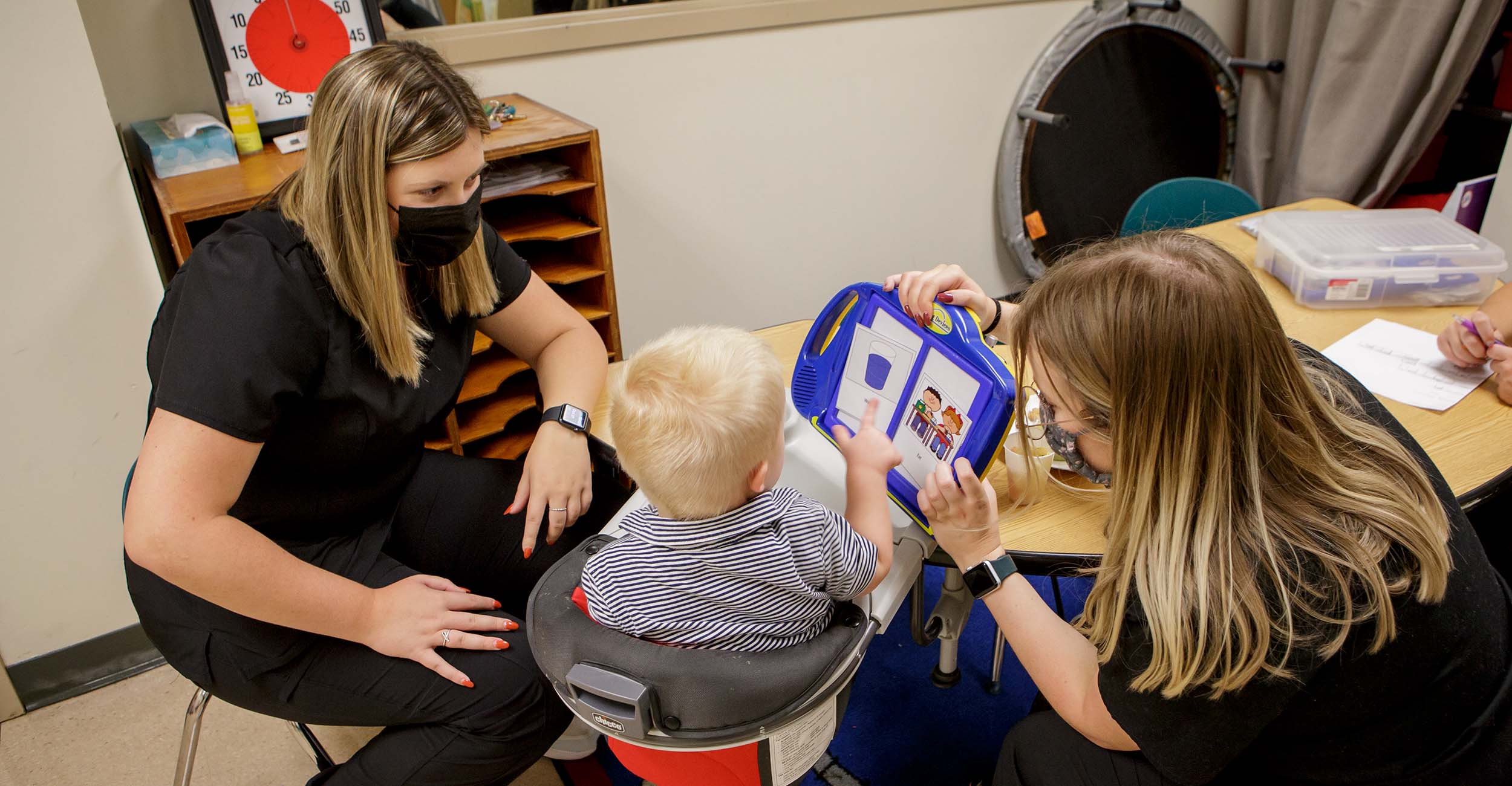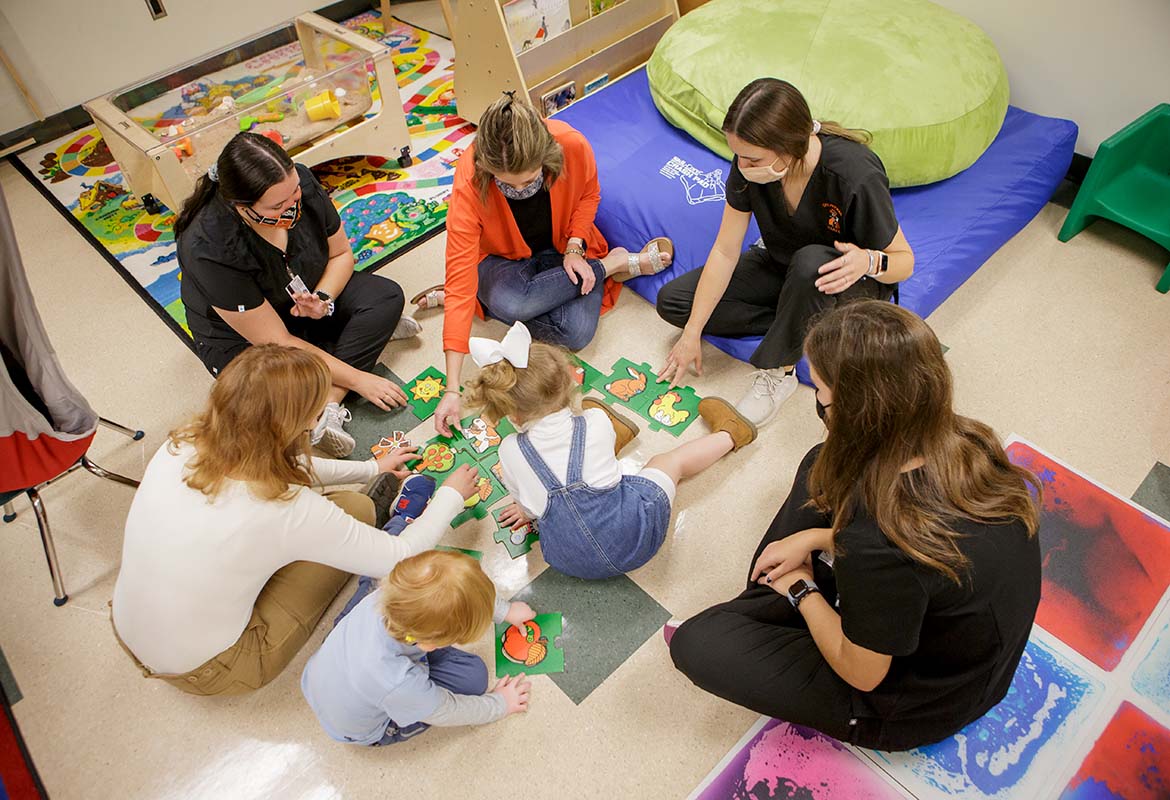
OSU Speech-Language-Hearing Clinic provides vital experience in career that needs clinicians
Tuesday, November 2, 2021
Media Contact: Jordan Bishop | Communications Specialist | 405-744-9782 | jordan.bishop@okstate.edu
Kristi Carpenter used to have to keep her answering machine unplugged at home because of the amount of job offers she kept getting.
It is like that for most speech language pathologists and audiologists, she said, as the demand has outgrown the number of clinicians in a burgeoning career field.
Carpenter, the coordinator of Oklahoma State University’s Speech-Language-Hearing Clinic, retired a few years ago after nearly three decades of working with the Payne County Health Department.
It was a rewarding 28 years, helping patients with all sorts of communications disorders, but Carpenter knew with every call she received about a job opening at a clinic that there just weren’t enough clinicians coming into the field.
So she came to OSU and in her two years here, she has seen the number of graduate students working in the clinic increase each year. With that, the clinic has been able to help more clients, and Carpenter has established an outreach program with some local schools to send students out into the community.
“I think our grad students being out in the community allows us to help where we can and also get them great experience, too,” Carpenter said.
OSU’s contracts are with Perry Public Schools and Stillwater Public Schools, as well as the Child Development Lab on the OSU campus and the Life Adult Day Center in Stillwater.
Those allow students to work with elderly clients as well as children to gain a well-rounded experience since most graduates will be asked to work with people of all ages when they enter the workforce.
“We try really hard,” Carpenter said. “We don’t have as many adult clients as we do kids, maybe 30 adult clients to 60 kids. Part of my job as a clinic coordinator, I try really hard to give them that adult experience while they are here so that they are prepared when they go to the hospital.”
Carpenter said most students come in wanting to specialize — and she herself is a specialist with children — but the biggest areas in need of professional speech language pathologists and audiologists are rural communities.
It’s why when a graduate decides to head back to their community to provide a service, she said it is one of the most important things they can do.
“Coming from a rural community myself, I find that is really lacking in a lot of rural places in Oklahoma,” Carpenter said. “They just don’t have a speech pathologist who lives in their community. There were a large number of clinicians in the class that graduated in May that were going back to their hometowns, either to work at the hospital or to work at the school. That is really good to hear. Tulsa and Oklahoma City have lots of SLPs, but any time you can send a qualified grad student back to serve a rural community, that is a win-win for everybody.”
In the clinic, located inside OSU’s Social Sciences and Humanities Building, students help with a variety of disorders, such as articulation, voice therapy, aphasia, reading and writing, stuttering, swallowing and more.
A new sensory room allows children to open up and helps with those who are on the autism spectrum. Thanks to the generosity of the Guthrie Scottish Rite Charitable and Educational Foundation, this sensory room space has been extremely beneficial for several children who need speech and language services.
Another new service the clinic is providing is voice therapy for transgender patients, which Carpenter said has seen a lot of use already.

The clinic accepts anyone in the community and provides a discount to OSU students, faculty and staff. Carpenter said the clinic has been packed with its therapy rooms completely booked almost every day. Because it is limited by space, she has started to have free screenings in the community as well.
“We only have 10 therapy rooms and from about 2:30 until 5:30 p.m., it is at full capacity,” Carpenter said. “We can’t serve any more individuals who need to come after those times because we don’t have the space, so I would love to see our space grow so that we can serve. We are only limited by the space that we have. We can provide the supervision, we can provide the expertise, we are just outgrowing our location.”
OSU does externships a bit differently than other schools because Stillwater is a smaller community. The first year, students work at OSU’s clinic and the second year, they head out into the professional realm to gain some more experience. This helps keep the program attractive to more grad students.
“They are working 40 hours, 8-5 some place for eight weeks,” Carpenter said. “It gives them a real-life experience. Most of the feedback that I get is that they feel pretty prepared for their externship, which is always good to hear.”
While it seems like a speech language pathologist or audiologist would be swamped because there are so few of them, Carpenter said the rewards outweigh any such negatives. It is a rewarding career — when she sees people come in unable to communicate and walk out being able to, it makes any challenges worth it.
“The days fly by. I get here before 8 and sometimes I leave at 6:30 or 7, and the whole day has gone by,” Carpenter said. “It only takes one family occasionally stopping by my office or sending me an email telling me what a life-changing event or impact this has had on their family to get me through many days of the paperwork and the insurance struggles. There are several clients here who are coming here now that I used to see in early intervention. To get to see them now at 5 or 6 or 7 and the impact on their speech compared to where they were when they were 2, it is just very rewarding.
“Speech pathology is still a huge career, but there are still not near enough of us.”
